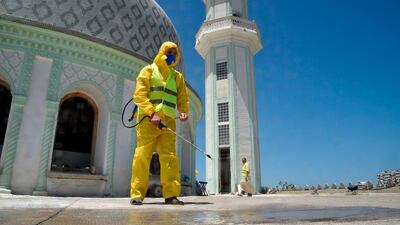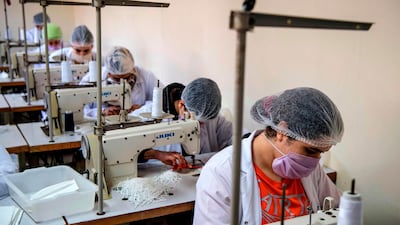Governments should avoid jettisoning efforts to cut carbon emissions as they restart their economies in the aftermath of coronavirus, a senior UAE minister has said.
Dr Thani Al Zeyoudi, Minister of Climate Change and Environment, warned recent improvements to air quality could be lost to a haze of “revenge pollution” as industries returned to normal operations.
In a research paper published online, he argued that the Covid-19 pandemic should act as “a wake-up call” for “greater global collective action”.
The study also stressed the threat of climate change and biodiversity loss was all too real, with consequences potentially far more “devastating" than the virus.
“The change in human behaviour, supply chains and transport due to Covid-19 lockdowns has already resulted in positive effects on the climate,” the authors wrote.
“Companies transformed everyday operations by allowing employees to work from home, including giant international companies like Twitter, Google and Facebook, as well as major organisations in the Middle East like Majid Al Futtaim.
“If governments decide to go back to the status quo after the end of the outbreak, and ignore the risks of climate change, transition to cleaner energy will slow down.”
The new paper, called A New Baseline for Greater Collective Action: The Impact of Covid-19 on our Environment and Climate Change, was published on May 10.
It was co-authored by Ibrahim Al Zu’bi, chief sustainability officer at Majid Al Futtaim Holding, an Emirati multi-national that owns shopping malls and hotels.
The study cited World Health Organisation figures indicating that air pollution killed seven million people a year globally, many times more than the number of Covid-19 deaths.
Researchers warned climate change had the same “negative effect on human beings” as the pandemic, but that its implications were “harsher” and “possibly irreversible”, with hundreds of millions of people already affected.
They urged governments to ensure the benefits of recent reduced carbon emissions were not lost in the months ahead, and compared today’s scenario with a Chinese stimulus package designed to tackle the 2009 financial crisis that resulted in a spike in pollution.
Instead, the paper said, supply chains disrupted by the pandemic should be redesigned to increase “onshoring” or bringing business operations abroad back into the home country, thereby lowering greenhouse gas emissions.
“As governments are designing stimulus packages to tackle the economic downturn due to Covid-19, we should advocate for these to be green packages,” the researchers wrote.
Other recent studies have also concluded governments must focus on continuing to build a low-carbon future post Covid-19.
Dr Ajay Gambhir, of The Grantham Institute for Climate Change at Imperial College London, co-authored a briefing paper for the UK government which encouraged a “net-zero emissions economic recovery” following the outbreak.
Initiatives should, he said, include investments in renewable energy. He also discussed energy storage strategies, the adoption of electric vehicles and programmes to help reduce commuting, which creates pollution.
“Clearly politicians are going to want to get economic activity going as quickly as possible,” said Dr Gambhir.
“There's a danger from an environmental perspective that they might be tempted in various parts of the world to support industries that are saying, 'We need to get up and running, don't worry about sustainability or climate change.'
“The key is that politicians and governments need to put their money where their mouth is and make this recovery as sustainable as possible.
“[Investments should be in] things like connectivity infrastructure, making sure people can get fast and reliable broadband so they can work from home more.”

A recent report on air pollution in China has already indicated that the country has bounced back from pollution lows recorded during its Covid-19 lockdown.
Government figures confirmed a significant spike in April, with monthly levels exceeding those recorded during the same period last year.
Experts from the Finland-based Centre for Research on Energy and Clean Air (CREA) warned the data suggested the beginning of a “dirty” economic rebound from the crisis, a strategy that ignores environmental concerns.
“Polls have shown people are still concerned about climate change,” said Asher Minns, executive director of the Tyndall Centre for Climate Change Research at the University of East Anglia in Norwich in the United Kingdom.
"Economic growth is going to be a high priority following the Covid-19 and lessons can be learned from the 2008 financial crisis.
"Rather than, 'Here's a lot of money, give it out at low interest rates,' we should include stimulus packages for energy storage, clean industry and transport, and even greenhouse gas removal."













